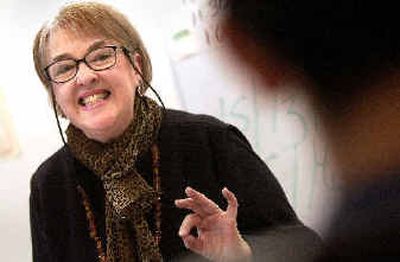Educator celebrates 40 years

Richi Caldwell nurtured the broken young men who returned from Vietnam and tried to get their lives back on track at Spokane Falls Community College. She’s scolded leather-wearing Hell’s Angels. Now, after 40 years of teaching, she’s finding more students than ever are suffering from depression.
Not yet ready to retire from teaching and helping her students, Caldwell has outlasted several college presidents, countless administrators and many peers. She received a standing ovation during an SFCC luncheon earlier this month for longtime employees. Only one other SFCC staffer has worked at Spokane’s community colleges longer.”I was the youngest faculty member in ‘64, by far,” said Caldwell, who teaches English, English as a second language and communications.
She was a year out of college herself with hair down her back.
“I started on the other campus (Spokane Community College) because this one hadn’t been built,” Caldwell said.
Her office in the communications building has a window, something she didn’t have at the start of her career, or in the library basement where she spent almost three decades. It’s a little cramped, she admits, but there’s no way she’s moving again now that she’s out of the basement.
Around 1963, the Spokane school district handed over its vocational buildings at Mission and Greene, which became the start of Spokane Community College. The community college system was started statewide to handle an increasing number of students.
The teachers shared one giant office, said Walter Spangenberg, a biology teacher who may be the only SFCC staffer who’s been there longer than Caldwell.
Caldwell came to the community colleges after graduating from Washington State University and working one year at KING-5 television in Seattle. Her husband landed a job in Spokane about 1964 and Caldwell found work at what is now Spokane Community College.
“It was one green building and a lot of portables,” she said.
Teachers handled duties like student registration.
“Richi jumped in and did all those kinds of things to get the school moving,” Spangenberg said. “Richi has sort of a missionary zeal. It’s a different kind of commitment.”
She needed that to handle the student body.
“I was younger than most of my students when I started,” Caldwell said.
One student named Ruth “probably had 30 years on me,” Caldwell said. “She called me ‘honey’ and I didn’t know what to do. I just kind of smiled and started wearing glasses” to look older.
In 1965, more than 200,000 American troops were serving in Vietnam and Caldwell started seeing the veterans come through her class.
“Sweet people, but real troubled young men,” Caldwell said.
She’d see some whose eyes revealed they were on speed. Some students would step outside during class to smoke a marijuana cigarette.
As the nation grew more polarized in its politics, her students came to class almost daring her to teach them anything, Caldwell said.
One student, who wore a Hell’s Angels leather jacket, swiped a tape recorder from her class. He eventually brought it back.
“I think I scared him,” she said. “I think women scared him.”
In 1968, Caldwell helped build the college’s radio broadcasting program. She knew FCC regulations better than most attorneys, said Mark Doerr, a broadcasting teacher who worked with her.
“It was pretty much her baby all the way through,” Doerr said. “She believed in hard work for the students.”
For 28 years, Caldwell built a program that was modeled on a working radio station. Students ran KSFC-FM, “The Falls Rock,” and held all the management positions under Caldwell’s guidance. It operated all hours, and Caldwell often worked long days.
“A lot of the students who came into the radio program were people who had problems,” said Larry Poole, 55, an SFCC employee who once worked with Caldwell as a radio and television technician.
The program attracted students who were seeking new chances and new careers.
“Richi would really take them on personally, counsel them and take extra time to find out what’s going on in their lives,” Poole said. “A lot of people keep that part separate. It’s really just built into her. She’s been like a mother to a lot of students.”
In 1995, facing budget cuts, the college eliminated the radio station to save $20,000 a year. Caldwell fought the administration’s plans, but eventually lost.
“It really knocked the wind out of her sails in the end,” Doerr said.
It’s still common to see Caldwell’s car on campus very early and very late, her co-workers said. Doerr said he wouldn’t be surprised if Caldwell worked another 10 years.
After 40 years, “she could sit back and watch everyone else doing the work,” said Pam Praeger, SFCC vice president of learning. “She’s still very vibrant and young. You get a sense she loves doing her job.”
Some of her students tell Caldwell that their parents took classes from her.
“I have a hard time at the end of every quarter. I don’t want them to go. I don’t want to say goodbye,” Caldwell said. “I don’t know if they understand that at all.”
Caldwell is planning a trip to Spain once classes end for the year. When she comes back next fall, Spangenberg said, a time-worn ritual will play out, as it does at the start of every new school year.
“I give her a hug,” Spangenberg said. “I’m old. She’s old. We’re still standing.”